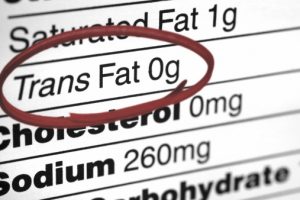
There are two main types of trans fats found in our food: the naturally occurring and the artificially made. The natural kind is made in the gut out of animal products, such as milk and meat. The artificial kind is created through an industrial process that adds hydrogen to liquid vegetable oil to make the oil solid. The most common source of trans fats is processed foods, as they are inexpensive and have a long shelf life. In November 2013, the FDA actually determined that partially hydrogenated oils are no longer Generally Recognized as Safe (GRAS) in human food, however, this has not stopped processed food companies from using them to produce the baked goods, chips, crackers, and fried foods we consume on a daily basis.
The FDA has gone as far as to call for a ban on the potentially harmful food ingredient. There is currently a pending regulation to remove nearly all trans fats from our diets in 2018, and some U.S. cities currently have implemented policies to reduce trans fats in restaurants.
“Our study highlights the power of public policy to impact the cardiovascular health of a population. Trans fats are deleterious for cardiovascular health, and minimizing or eliminating them from the diet can substantially reduce rates of heart attack and stroke,” said study author Dr. Eric Brandt. He’s a clinical fellow in cardiovascular medicine at the Yale School of Medicine.
The study on trans fats led researchers to compare data between 2002 and 2013 from New York counties with and without restrictions on trans fats. They found a six percent decline in hospitalizations for heart attacks and stroke in areas with trans fats restrictions compared to those without, all within three years of starting the no trans-fat policies. Despite seeing a substantial decline and demonstrating a link between trans-fat restrictions and lower risk for heart attack and stroke, the research team stresses that the study wasn’t designed to prove a direct cause and effect link, with more study needed in that regard.
“Even though some companies have reduced the amount of trans fat in food, current FDA labeling guidelines allow up to 0.49 grams of trans fat per serving to be labeled as 0 grams, leaving consumers to scour labels for hidden trans fats, usually labeled as partially hydrogenated oils,” Brandt explained in a Yale news release. “With the upcoming FDA regulation, people need not be so vigilant. A nationwide trans-fat ban is a win for the millions of people at risk for cardiovascular disease.”
Related: Are all trans fats bad or are some good for health?